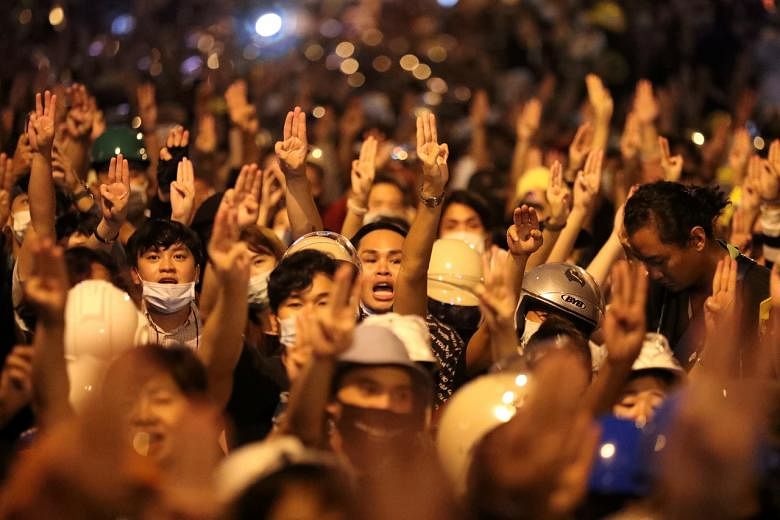BANGKOK (BLOOMBERG) - With Thai protests intensifying against the monarchy, Prime Minister Prayut Chan-o-cha's hold on power is growing more tenuous by the day.
A poll published Sunday (Oct 25) by Bangkok's Suan Dusit University showed more than 62 per cent of participants said discontent with Prayuth was the key reason for the recent demonstrations.
The former army chief has run Thailand for more than six years, taking power in a 2014 coup and returning as premier after elections last year under a constitution produced by his military regime.
Mr Prayut has so far refused to resign in the face of repeated deadlines set by protesters to step down. During a special parliament session this week, he said that the government would restart in November a stalled process for amending the constitution and accused many lawmakers of having "short memories."
"If I didn't take power in 2014, what would happen?" he told Parliament on Tuesday. "Would there be riots in Thailand? Did you forget all the things that happened before I came in? Did you forget all the chaos, all the corruption?"
But even if Mr Prayut quits, protesters say they aren't going anywhere until the political system engineered by the royalist elite is also gone.
That means they'll continue pushing their other demands: A more democratic constitution and more accountability for King Maha Vajiralongkorn.
Same problems
"The protest movement won't end until we've reached all of our three demands," Jatupat Boonpattararaksa, a key protest leader, said in a phone interview.
"Even if Prayut quits, someone like Prayut will replace him and we'll go back to the same problems again. All the changes in the government, the charter and the monarchy need to happen at the same time."
The growing resolve of key protesters shows that there's no easy short-term solution to end the movement. They've adopted Hong Kong-style tactics to keep police off balance, prompting Mr Prayut to lift a state of emergency in Bangkok last week after authorities struggled to enforce it.
Much like the Hong Kong protests, which made demands for democracy that threatened an entrenched power, the Thai demonstrators are looking to upend the royalist elite that has run the country for much of its history.
While China managed to stem large-scale protests by implementing a repressive national security law, Thailand's leaders potentially face a greater risk with a more aggressive response.
Any action that leads to bloodshed - which has occurred throughout Thailand's history, most recently in 2010 - could further hurt an economy dependent on trade and tourism that is already reeling from the pandemic. Thailand's benchmark SET Index has fallen almost 24 per cent this year, the most in Asia.
Upper hand
Mr Prayut would only consider resignation if the government loses legitimacy due to using force on protesters or an economic crisis, according to Prof Siripan Nogsuan Sawasdee, head of the Department of Government at Chulalongkorn University's Faculty of Political Science.
"The government for now still has the upper hand," she said.
Even if Mr Prayut goes, the system that allowed him to take power without standing in the election is still in place. The constitution now gives the 250-member Senate, which is appointed by the military, a vote for the prime minister along with the 500-member lower house - stacking the odds in favour of the establishment candidates.
Possible replacements for Mr Prayut include Deputy Premier Anutin Charnvirakul and former premier Abhisit Vejjajiva, who were both nominated for prime minister during the last election.
But if they don't muster enough support, the charter allows for the possibility of an "outsider" candidate to contest, with analysts saying that could include someone like Mr Apirat Kongsompong, a former army chief who's now working for the palace.
"The system was designed to keep the establishment in power, so it's unlikely that they'll do anything to change that structure," said Prof Punchada Sirivunnabood, an associate professor of politics at Mahidol University near Bangkok.
"They may agree to either some changes to the constitution, or the government's resignation, but not both."
The final demand on changes to the monarchy is the most ambitious. Protesters have broken long-held taboos about publicly criticising the royal family, with demands for the monarch to no longer endorse coups, provide transparency in how funds are spent, and get rid of laws that stifle discussion of the royal family.
Global Reach
Protesters have begun making their case on the world stage: On Monday, they submitted a letter to the German Embassy in Bangkok asking the government in Berlin to investigate the king, who spends much of his time in the European country, over tax and visa violations there.
German Foreign Minister Heiko Maas said authorities were examining the issues, and warned there would be "immediate consequences" if they found anything illegal.
The palace hasn't commented on the protester demands, or the remarks from the German authorities. Calls to the Bureau of the Royal Household seeking comments went unanswered on Tuesday.
"The student demand for a reform to the monarchy is the least likely to be addressed," said Prof Christopher Ankersen, associate professor at New York University's School of Professional Studies Center for Global Affairs.
"It's not evident that this king would be interested in agreeing to them. It's difficult to imagine him being convinced to 'retire' from the scene, relinquish day to day control over the kingdom or live out the rest of his days as a true constitutional monarch."
Still, protest organisers like Jatupat believe they have momentum on their side despite the long odds.
"Each time we hold a demonstration, there are more and more people joining," said Jatupat. "People are optimistic that there will be changes."

